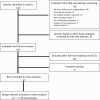Risk Factors for Psychotic Relapse After Dose Reduction or Discontinuation of Antipsychotics in Patients With Chronic Schizophrenia. A Meta-Analysis of Randomized Controlled Trials
- PMID: 36200866
- PMCID: PMC9810020
- DOI: 10.1093/schbul/sbac138
Risk Factors for Psychotic Relapse After Dose Reduction or Discontinuation of Antipsychotics in Patients With Chronic Schizophrenia. A Meta-Analysis of Randomized Controlled Trials
Abstract
Background and hypothesis: Although maintenance treatment with antipsychotics protects against psychotic relapse, high doses may hamper recovery. Therefore, dose reduction or discontinuation may be considered in patients with chronic schizophrenia. Here, we identified risk factors for psychotic relapse when doses are reduced.
Study design: We systematically searched MEDLINE, EMBASE, and PsycINFO from January 1950 through January 2021 and reviewed randomized controlled trials (RCTs) that reported relapse rates after antipsychotic dose reduction or discontinuation in patients with chronic schizophrenia. We calculated relative risks (RRs) with 95% confidence intervals (CIs) per person-year and sought to identify potential risk factors for relapse. The study is registered with PROSPERO (CRD42017058296).
Study results: Forty-seven RCTs (54 patient cohorts, 1746 person-years) were included. The RR for psychotic relapse with dose reduction/discontinuation versus maintenance treatment was 2.3 per person-year (95% CI: 1.9 to 2.8). The RR was higher with antipsychotic discontinuation, dose reduction to less than 3-5 mg haloperidol equivalent (HE), or relatively rapid dose reduction (<10 weeks). The RR was lower with long-acting injectable agents versus oral antipsychotic dose reduction. Other factors that increased the risk of psychotic relapse were younger age and short follow-up time.
Conclusions: Clinicians should take several risk factors for psychotic relapse into account when considering dose reduction in patients with chronic schizophrenia. Studies of a relatively fast reduction in antipsychotic dose support a minimum dose of 3-5 mg HE. However, if the dose is tapered more gradually, relapses related to medication withdrawal might be avoided, possibly enabling lower-end doses to be achieved.
Keywords: adverse events; antipsychotic doses; gradual reduction; maintenance treatment; recovery; tapering; withdrawal.
© The Author(s) 2022. Published by Oxford University Press on behalf of the Maryland Psychiatric Research Center. All rights reserved. For permissions, please email: journals.permissions@oup.com.
Similar articles
-
Standard versus reduced dose of antipsychotics for relapse prevention in multi-episode schizophrenia: a systematic review and meta-analysis of randomised controlled trials.Lancet Psychiatry. 2021 Jun;8(6):471-486. doi: 10.1016/S2215-0366(21)00078-X. Lancet Psychiatry. 2021. PMID: 34023019
-
TAILOR - tapered discontinuation versus maintenance therapy of antipsychotic medication in patients with newly diagnosed schizophrenia or persistent delusional disorder in remission of psychotic symptoms: study protocol for a randomized clinical trial.Trials. 2017 Sep 29;18(1):445. doi: 10.1186/s13063-017-2172-4. Trials. 2017. PMID: 28962668 Free PMC article. Clinical Trial.
-
Factors associated with successful antipsychotic dose reduction in schizophrenia: a systematic review of prospective clinical trials and meta-analysis of randomized controlled trials.Neuropsychopharmacology. 2020 Apr;45(5):887-901. doi: 10.1038/s41386-019-0573-7. Epub 2019 Nov 26. Neuropsychopharmacology. 2020. PMID: 31770770 Free PMC article.
-
Effect of discontinuation v. maintenance of antipsychotic medication on relapse rates in patients with remitted/stable first-episode psychosis: a meta-analysis.Psychol Med. 2019 Apr;49(5):772-779. doi: 10.1017/S0033291718001393. Epub 2018 Jun 18. Psychol Med. 2019. PMID: 29909790
-
Antipsychotic Medication Continuation vs Taper and Discontinuation in Patients With Schizophrenia and Other Nonaffective Psychotic Disorders.J Clin Psychiatry. 2024 May 15;85(2):24f15363. doi: 10.4088/JCP.24f15363. J Clin Psychiatry. 2024. PMID: 38767930 Review.
Cited by
-
Systematic literature review of schizophrenia clinical practice guidelines on acute and maintenance management with antipsychotics.Schizophrenia (Heidelb). 2022 Feb 24;8(1):5. doi: 10.1038/s41537-021-00192-x. Schizophrenia (Heidelb). 2022. PMID: 35210430 Free PMC article.
-
Efficacy and Safety of Roluperidone for the Treatment of Negative Symptoms of Schizophrenia.Schizophr Bull. 2022 May 7;48(3):609-619. doi: 10.1093/schbul/sbac013. Schizophr Bull. 2022. PMID: 35211743 Free PMC article. Clinical Trial.
-
Contact with mental health services in the 12-month period before offending in a cohort of forensic order patients.Psychiatr Psychol Law. 2021 Apr 9;28(6):934-945. doi: 10.1080/13218719.2021.1894264. eCollection 2021. Psychiatr Psychol Law. 2021. PMID: 35694645 Free PMC article.
-
Does Slow and Steady Win the Race? Rates of Antipsychotic Discontinuation, Antipsychotic Dose, and Risk of Psychotic Relapse.Schizophr Bull. 2024 Apr 30;50(3):513-520. doi: 10.1093/schbul/sbad139. Schizophr Bull. 2024. PMID: 37797288 Free PMC article.
-
Can the use of long-acting injectable antipsychotic preparations be increased in routine clinical practice and the benefits realised?Ther Adv Psychopharmacol. 2022 Feb 15;12:20451253211072347. doi: 10.1177/20451253211072347. eCollection 2022. Ther Adv Psychopharmacol. 2022. PMID: 35186261 Free PMC article.
References
-
- Leucht S, Tardy M, Komossa K, et al. . Antipsychotic drugs versus placebo for relapse prevention in schizophrenia: a systematic review and meta-analysis. Lancet. 2012;379: 2063–2071. - PubMed
-
- Schneider-Thoma J, Chalkou K, Dörries C, et al. . Comparative efficacy and tolerability of 32 oral and long-acting injectable antipsychotics for the maintenance treatment of adults with schizophrenia: a systematic review and network meta-analysis. Lancet. 2022;399:824–836. - PubMed
-
- Shimomura Y, Kikuchi Y, Suzuki T, Uchida H, Mimura M, Takeuchi H.. Antipsychotic treatment in the maintenance phase of schizophrenia: an updated systematic review of the guidelines and algorithms. Schizophr Res. 2020;215:8–16. - PubMed
-
- Bjornestad J, Lavik KO, Davidson L, Hjeltnes A, Moltu C, Veseth M.. Antipsychotic treatment—a systematic literature review and meta-analysis of qualitative studies. J Ment Health. 2020;29:513–523. - PubMed
Publication types
MeSH terms
Substances
LinkOut - more resources
Full Text Sources
Other Literature Sources
Medical


